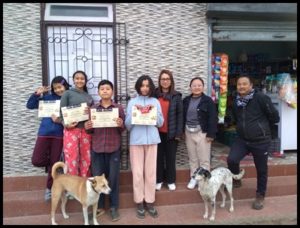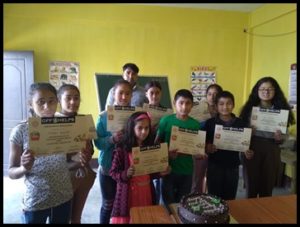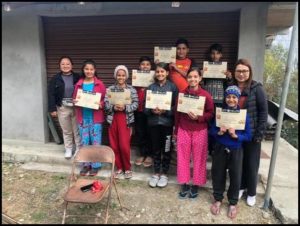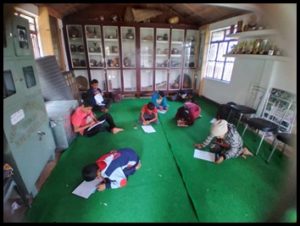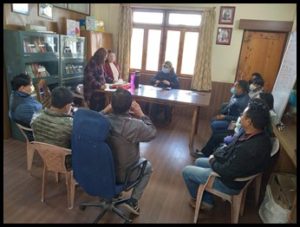It’s been a year since the virus has blanketed the world. Covid-19 has affected individuals of every race, class, color, religion, gender and the like. While we await the development of an efficacious vaccine, it is important to boost the immune system- an important option to tackle the disease. Studies have shown that people who eat well balanced diet tend to be healthier. More than 2,500 years ago, Hippocrates said: “Let food be thy medicine and medicine be thy food.” Consuming fruits and vegetables that are loaded with vitamins, minerals and other compounds puts one at lower risk of chronic illness and infectious diseases. Maintaining good nutritional status can help fight against the virus. Immune health can be obtained and maintained by following a healthy diet as well as regular exercise.
 Vegetable garden project was implemented in the kitchen garden of the beneficiaries. A kitchen garden is a garden or an area where vegetables, fruits and herbs are grown for domestic use. The main objective of this project was to make the children and their parents aware of locally found vegetables and the value of nutrient content in it- which helps in boosting the immune system. Through this, both the parents and children will learn about the importance of locally grown vegetables and its health benefits. The project also aimed to promote organic farming to create a sustainable agro-ecological system based on local resources. In order to help them better understand, we prepared a booklet which contained information on scientific names, health benefits, edible parts, nutrient contents.
Vegetable garden project was implemented in the kitchen garden of the beneficiaries. A kitchen garden is a garden or an area where vegetables, fruits and herbs are grown for domestic use. The main objective of this project was to make the children and their parents aware of locally found vegetables and the value of nutrient content in it- which helps in boosting the immune system. Through this, both the parents and children will learn about the importance of locally grown vegetables and its health benefits. The project also aimed to promote organic farming to create a sustainable agro-ecological system based on local resources. In order to help them better understand, we prepared a booklet which contained information on scientific names, health benefits, edible parts, nutrient contents.
The written assessment for children was held in their respective village, where in GFF Helps representatives assigned 30 minutes to complete 14 multiple choice questions. Upon completing the written assignment, the representatives evaluated the paper and assigned marks. Based on photo reporting as well as test papers, winners were selected for the assigned category. On the 15th of January, written assessment for the mentor was held in the GFF Helps office premise. This was followed by evaluation, wherein the winners were selected based on their performance throughout the project.
The project started during the onset of the monsoons, because of which the sowing period was harsh. This year unexpected heavy rains was experienced in the region that caused damage to many of the plants. Although this was a major challenge, the mentors guided their beneficiaries and ensured the re-sowing of the seeds and saplings. This provided us a platform to assess the leaders as well as the beneficiaries who put in a lot of effort to the project. It also helped us understand that projects like this are better implemented after the downpour season is over.
The project lasted 6 months and was implemented successfully. Though faced with challenges, the effort made by the mentors and the beneficiaries is well appreciated. For most of the beneficiaries it was a new experience that they enjoyed thoroughly.
by Nikita Rai and Melissa Namchu, Local Representatives


